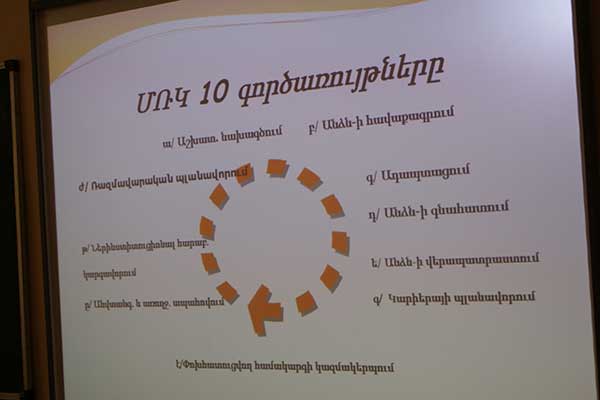


NUACA hosted training seminars for its personnel from 19 to 21 May in the frames of TEMPUS GOVERN project. The topics of the trainings were human resources, financial management and result-based problems of budgeting.
On May 19 the assistant at the NUACA Chair of Informatics, Information Technologies and Management Gohar Avetisyan presented to the University personnel the importance of human resource management in the HEIs in the processes of faculty and administrative staff administration, assessment and training. She came up with detailed presentation of human resources management functions on the example of NUACA such as work planning, personnel recruitment, adaptation, training, career planning, formation of the compensation system, facilitation of personnel security and health issues, regulation of inter-institutional relations and strategic planning.
On May 20 NUACA vice-rector Marine Ghazaryan delivered a course on result based budgeting. She particularly mentioned that many organizations of public administration, such as community authorities, have already adopted the principles of result based budgeting. Currently there are 6-7 types of budgeting recognized in the world and the approach of result based budgeting is particularly important for the HEIs providing the efficient utilization of resources, righteous risk assessment and result measurement. Mrs. Ghazaryan presented the worksheets of result based budgeting and the training was summed up by the discussion of situational problems.
On May 21 NUACA staff member from the Division of International Relations Mkhitar Balayan presented the financial management problems based on the experience of the European HEIs. The report was based on the information and analyses of contrast management consulting of World University Service (WUS) of Austria. The financial and management problems of HEIs actions and results were stressed. The main risk factor is the increase of educational services’ expenditures conditioned by common and technological demand, the need of educational programmes’ modernization and quality improvement, the wages of the personnel and growth of costs per a student. To overcome the mentioned risk the main factors are the hiking tuition fees, differentiation between educational and scientific-research services, increasing private subsidizes and market-oriented events (research, services, new specialties) and performance based funding. The discussion among participants was about
The participants were engaged in active discussion about the main essence of the process, their application tools and probability wishing that those approaches would soon be applicable also in our University.